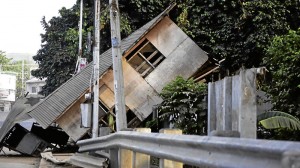After the deluge, the movie
Indie filmmaker Khavn de la Cruz decided to unveil his latest work, “Kalakala,” in Cagayan de Oro City, which was ravaged by floods triggered by Tropical Storm “Sendong” last year.
De la Cruz, whose short film “Pusong Wazak” competed in Berlin last February, chose to premiere “Kalakala” on March 10 at the Barangay (village) Nazareth Covered Court in the capital city of Misamis Oriental—the same devastated place that inspired him to make what he calls a “film opera.”
It was not the “usual” movie premiere, he conceded. He surmised that it was probably the first time the local audience was exposed “to this kind of cinema: avant-garde, experimental, antinarrative, poetic.”
Creative documentary
He described his film as “creative documentary, a mix of fiction and docu—the story of a survivor who was found roaming the city streets in broad daylight … a dead infant in his arms.”
Article continues after this advertisementHe added that “Kalakala,” which is the name of a flooded sitio in barangay Macasandig, is a “silent film that was screened accompanied by live music and performances.”
Article continues after this advertisementAt the screening, poet Jose F. Lacaba, who was born in Cagayan de Oro, read Bienvenido Lumbera’s translation of T.S. Eliot’s “The Waste Land.” Singer Tao Aves lent her voice as the “ghost of the hero’s dead wife.”
De la Cruz recounted that the Cubed Children’s Choir sang three melancholy Visayan songs a cappella during the first part of the film. “I played a 10-minute piano solo in the second part and seven tribes performed indigenous music in the third part.”
Saxophonist Ronald Tomas played a four-minute solo nonstop during the film’s fourth part, said De la Cruz. “In the fifth and final section of the film-concert, everyone played a 20-minute post-rock coda.”
Exhilarating
It was exhilarating he said, looking back at the event. “Many in the audience told me that they were blown away. Some were inspired to make their own films. I hope to conduct a filmmaking workshop there soon.”
Proceeds from the film screening/concert will go to the “environmental protection of Cagayan de Oro River, disaster preparedness and emergency response training, as well as the preservation of the culture of the indigenous people of Northern Mindanao.”
De la Cruz quipped that these days, “filmmaking has become an exercise in disaster management.”
He recalled that last December, while shooting another film, his actor, Ted Esguerra, a military doctor, had to fly to Cagayan de Oro for relief operations.
“I thought I could squeeze in a shoot with him there,” he related. “Instead I found myself in an evacuation center in barangay Macasandig, one of the hardest hit areas.”
He interviewed two kids who had survived the floods. “They swam past corpses and clung to a fallen coconut tree until they were rescued. But they were left in hospital for three days, without food or water…”
He plans to bring “Kalakala” all over the country and to the rest of the world. “I’ve received invitations from various universities and institutions in Mindanao. It will have its world premiere in an international documentary festival this year.”
